Politics
Conservative Party must change or die, says Andrew RT Davies

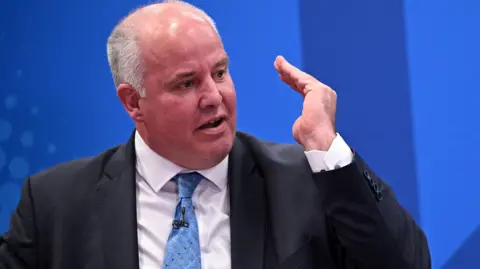 Reuters
ReutersThe Conservative Party must change quickly or “die”, the party’s leader in the Senedd has said.
Andrew RT Davies added that colleagues should apologise for not keeping immigration promises.
Davies will address the Birmingham conference on Sunday, the first gathering of Tory politicians and activists since July’s election defeat.
The party lost power at Westminster and was reduced to 121 MPs.
The Conservatives were wiped out in Wales.
As well as failings on immigration, voters were turned off by the party’s “dogmatic” stance on the economy, Davies said.
He said there needed to be a “zero tolerance” approach to immigration, with those in the UK illegally removed swiftly.
Davies said: “The Conservative Party must change. No party has a God-given right to govern. We failed to keep our promises and we must say sorry.
“By proudly reflecting our conservative values, we will persuade them [voters] to back the Welsh Conservatives.
“But we must also change how we are perceived on the economy. We must be seen as pragmatists, not ideologues.”
Davies believed his party’s take on things like nationalisation must change.
 NEC Group
NEC Group“Welsh industries and communities have paid the price of globalisation and our party must do more to protect them,” he said.
“We must show that we care, and defend their sense of community, togetherness, and local pride.
“If our party changes, we’ll recover quickly, and we’ll succeed in 2026 and 2029.
“But if we don’t, we’ll die. That’s the choice.”
The Labour Welsh government was dominated by an “extreme metropolitan worldview, combined with soft nationalism,” he added.
This, he believed, had led to 20mph speed limits and the expansion of the Senedd rather than improving public services.
Meanwhile, Byron Davies, the shadow Welsh Secretary, suggested criticising the Welsh Labour government wasn’t enough to woo voters at the next Senedd elections in 2026.
“Yes, while we do not agree with the 20 mile an hour limits everywhere. Yes, we understand that there is an issue with the National Health Service and waiting lists in Wales, but we’ve got to be able to offer something,” Lord Davies told BBC Politics Wales.
“We’ve got to be able to say, ‘look, these are our policies’.
“‘This is what you can turn to, these are the opportunities that we can give you’, and we need to develop that.”
Politics
What could reparatory justice for slavery look like?

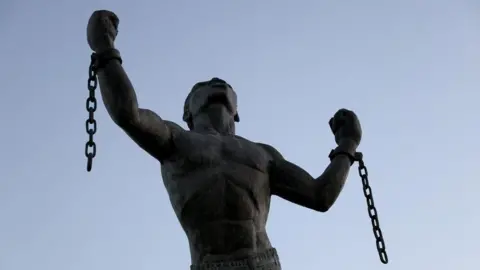 Getty Images
Getty ImagesCalls for the UK to provide reparations for its historic role in the slave trade have reignited ahead of a meeting of Commonwealth countries on Friday.
While Sir Keir Starmer said reparatory justice would not be on the agenda, Commonwealth leaders have defied the prime minister and plan to move towards a “meaningful conversation” on the issue.
The UK has long faced calls to provide reparations for its role in the Atlantic slave trade which saw millions of Africans enslaved and forced to work, largely on plantations in the Caribbean and Americas.
The chancellor told the BBC the UK would not be “paying out” reparations – but might there be other forms of reparations to consider, and how likely is it that the UK would commit to them?
Reparations are measures to make amends for past actions deemed wrong or unfair.
From 1500, the British government and the monarchy were prominent participants in the centuries-long slave trade, alongside other European nations.
Britain also had a key role in ending the trade, through Parliament’s passage of a law to abolish slavery in 1833.
As part of that law, British plantation owners were paid for the loss of their slaves, to the tune of some £20m.
The UK only finished paying off the debt it incurred to cover the payments in 2015.
Reparations for the benefit of those who suffered as result of slavery can take many forms, from financial to symbolic.
The United Nations says they must be “proportional to the gravity of the violations and the harm suffered”.
Here are some of the forms they can take.
Money
This is the most commonly understood form of reparatory justice – where a state gives money to a country whose communities it enslaved.
A 2023 report co-authored by a United Nations’ judge concluded that the UK owed more than £18tn to 14 countries in reparations.
The difficulty is that most European countries would struggle to find sums as astronomic as that.
The UK government, for example, spends a total of about £1.2tn every year.
Even if governments could find the money, it would be politically unpopular to spend so much on reparations and consequently less on schools and hospitals at home.
Some campaigners answer these points by saying reparations could be paid over time.
But many demands for straight cash payments are considered unfeasible by Western governments.
So for others, the debate about financial reparations often focuses instead on the question of debt relief.
Many developing countries which suffered from slavery owe large sums to Western countries.
The cancellation or reduction of that debt could lift a massive economic burden from a developing country at little political cost for a donor country.
Apology
On the face of it, this could appear relatively straightforward.
It does not cost anything, just a public act of atonement for past sins.
Some institutions – such as the Church of England – have apologised for links to slavery.
The difficulty, though, is that apologies can sometimes act as a declaration of legal responsibility for which there could be a financial cost.
Which is why states are often reluctant to take that step.
Earlier this week, former Prime Minister Tony Blair suggested it was wrong for states to apologise for historic wrongs – despite himself saying “sorry” in 2007.
“You can go back over history, and you end up in a completely absurd position”, he told Newsweek on Wednesday.
“The most important thing we can do for countries that have been marked by colonialism is to help them now.”
Few states that played a historic role in the slave trade have taken steps towards reparations.
Education
This includes educational institutions acknowledging their own connection to slavery and how they might have profited from the slave trade.
It can also involve teaching the history of slavery, as well as creating institutions for the study of slavery.
There are also calls for supporting schools to tackle low literacy levels and other issues that some argue date back to the slave trade.
Some campaigners say school exchanges and cultural tours would also be beneficial.
The countries pushing hardest for reparatory justice from the UK are in the Caribbean – and their collective organisation, known as Caricom, has its own reparations commission with 10 demands.
Three of these deal explicitly with education and culture, saying a “restoration of historical memory” was required.
Caricom said states involved in the slave trade had a responsibility to “build educational capacity and provide scholarships”.
Health
Some argue that reparatory justice should also include health – where European countries fund clinics and hospitals.
Medical evidence shows a high rate of type 2 diabetes in the Caribbean which some suggest is associated with centuries of poor nutrition due to past enslavement.
Historian Sir Hilary Beckles told the United Nations’s UN News earlier this year: “If you look at countries with the greatest incidence of chronic diseases, black people have the highest proportions of diabetic adult patients in the world.”
He argued high rates of diabetes on his own island of Barbados “cannot be a coincidence” given it was “the first island to have an African majority and an enslaved population”.
Barbados’ government has moved toward exploring the historic impact of slavery on its population’s health.
Caricom is calling for European countries to invest in science, technology and capital toward improving hospitals, healthcare, and mental health support for the descendants of enslaved people.
Is the UK likely to provide reparations?
The UK government has never formally apologised for slavery or offered to pay reparations – and Sir Keir Starmer has not shown any intention to break the mould.
It is not Labour Party policy to introduce reparations.
Ahead of the Commonwealth summit, the prime minister explicitly said he would not provide an apology or financial compensation for slavery.
He said he wanted to focus on present issues, like the climate, rather than the past.
Chancellor Rachel Reeves doubled down on Thursday afternoon, insisting the UK would not be paying reparations.
“I’d rather roll up my sleeves and work… on the current future-facing challenges than spend a lot of time on the past”, she said.
In 2023, then Prime Minister Rishi Sunak likewise refused to provide compensation or an apology for the slave trade.
“Trying to unpick our history is not the right way forward”, he said.
Politics
Victims concerned over missing Windrush reform
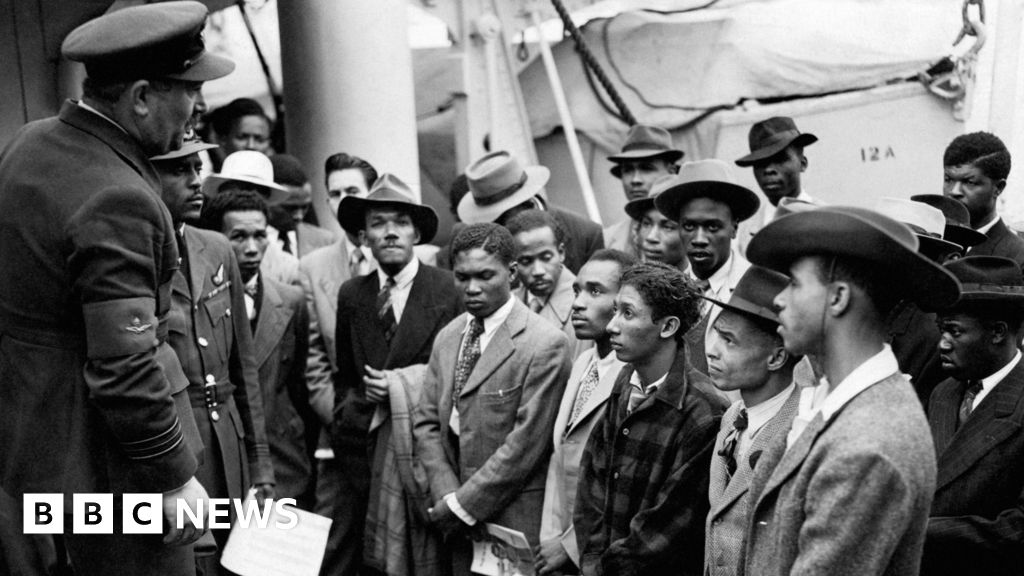
Windrush campaigners have expressed concern that the home secretary has yet to announce when she will implement a key recommendation from the government’s review.
On Thursday, Yvette Cooper announced an additional £1.5m of funding to help victims apply for compensation overseen by a Windrush Commissioner – but did not hand over recommended powers to a watchdog.
Campaigners told the BBC they were happy with Labour’s approach, but thought the new system lacked “teeth”.
A Home Office source described the changes as the “first set of announcements on Windrush since the election,” adding that the focus had been on priorities highlighted by campaigners and victims.
The Windrush Review’s report, published by Wendy Williams in 2020, made 30 recommendations which were all adopted by then home secretary Priti Patel.
But in January 2023, her successor Suella Braverman dropped three of them, including establishing a migrants’ commissioner role and giving the immigration watchdog – the Independent Chief Inspector of Borders and Immigration – the power to publish its own reports.
The watchdog currently has the power to carry out investigations, but the findings can only be published by the home secretary.
Following a legal challenge by Windrush victim Trevor Donald, a judge in June condemned Braverman’s actions as “conspicuously unfair”.
On Thursday, Cooper announced a Windrush commissioner would be appointed, but did not mention the Independent Chief Inspector of Borders and Immigration.
In February the then-chief inspector David Neal was sacked for leaking reports he had written that he claimed the Home Office was sitting on.
At the time, Cooper who was still in opposition said a “series of Conservative home secretaries have sought to bury uncomfortable truths revealed by the chief inspector”.
On Thursday, Cooper said she was “changing the government’s approach” to “ensure a scandal of this kind can never happen again and dignity can be restored to those so tragically affected”.
A Home Office source said this was the “first set of announcements on Windrush since the election” and said the focus had been on priorities raised by campaigners and victims.
They indicated that a new Windrush Unit, also announced today, could look at how to implement the final recommendation.
Following today’s announcement Cooper met representatives of Windrush campaign groups.
Some of those present welcomed the tone of the home secretary and said the new government appeared to “get” what it was that campaigners were looking for.
But they said there was no mention of when the Home Office would look at more powers for the chief inspector.
One said that the chief inspector needs to “have teeth” and be able to hold ministers to account “in a proper way”.
They said today’s meeting “marked the beginning” of relations between the new Labour government.
Campaigners said that Cooper had made it clear there were still parts of the Home Office that needed to change.
Another said the meeting was “uplifting” compared to ones held with Conservative ministers, but said the chief inspector “needs to be able to publish its findings” in order to prevent a similar scandal happening again.
The Windrush scandal emerged in 2018 when Commonwealth citizens, mostly from the Caribbean, were wrongly detained, deported or threatened with deportation despite having the right to live and work in the UK.
It was discovered that the Home Office had kept no records of those granted permission to stay and had not issued the paperwork they needed to confirm their status.
Many lost homes and jobs and were denied access to healthcare and benefits.
The government apologised in 2018, when it launched the Williams’ review.
Politics
Nigel Farage calls on Tory councillors to switch to Reform UK

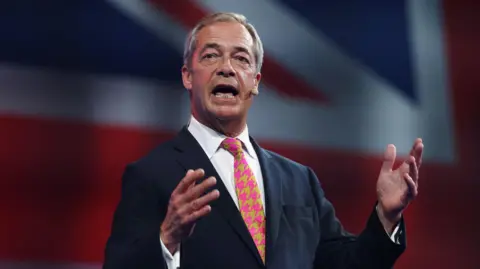 Reuters
ReutersNigel Farage has called on Conservative county councillors to defect to his Reform UK party.
In a letter obtained by the BBC, party leader Farage warns Tory councillors Reform’s “ground campaign capabilities will be formidable” by May’s local elections.
Speaking on X, Farage, who is also MP for Clacton in Essex, said he was writing to 1,352 Conservative county councillors as “a huge number of them genuinely agree with us and what we stand for”.
A Conservative party spokesman said: “Reform has delivered a Labour government. A vote for Reform this coming May is a vote for a Labour council.”
‘Councillors in talks with us’
In a letter sent to Essex Conservative county councillors, Farage says “our door is open should you consider standing for Reform UK”.
Farage told them since the general election “we’ve been assembling a national election winning machine at historic speed with hundreds of branches already established and over 90,000 active members ready to campaign”.
He has given Conservative councillors until 6 November to join and warns there will be a Reform candidate standing against them.
“Once somebody has been selected, we will not stand them down,” he wrote.
Farage said there were “other councillors in talks with us” after two Southend councillors defected from the Conservatives in September.
Conservative Kevin Bentley, leader of Essex County Council, said Farage’s letter “does smack of desperation”.
He said: “Some members have had a message from Reform and dismissed it.”
First Reform county councillor
A former Conservative councillor who was briefly a general election candidate has joined Reform UK.
Jaymey McIvor, who represents Ongar on Essex County Council, announced on X that he had joined Farage’s party.
The Conservatives said McIvor was expelled from the party on 9 October following a disciplinary hearing.
McIvor said he had already quit and that he had joined Reform UK as it “puts people and country first”.
He accused the Conservative Party of being “too weak to deal with its handful of toxic individuals” and they “tried to punish my ambition and vision”.
He said: “Reform has won the trust of the next generation. We are the future, we want our country back on track, rescuing it from the unpatriotic minority and put the patriotic majority back in the driver’s seat.”
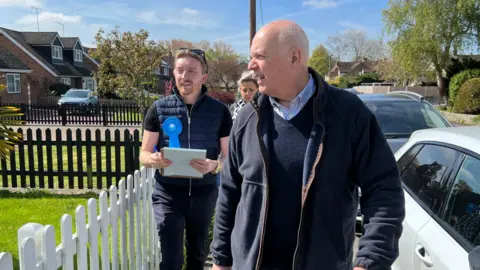
McIvor was selected to stand for the Conservatives in Hemel Hempstead in the general election. But hours from the deadline for nominations to be submitted he was dropped and suspended by the party pending an investigation.
A Conservative spokesperson said: “Mr McIvor was suspended by the party and removed from the candidates list in June.
“After a disciplinary hearing, he was expelled from the Conservative Party on 9 October.”
McIvor says he will “continue to serve my residents” as a Reform UK councillor on both Essex County Council and Epping Forest District Council.
Elections for Essex County Council are due to be held in May 2025.
Earlier this year, McIvor posted on X: “For every person that joins Reform UK , they become another campaigner for a Labour government, which would achieve the polar opposite to what they want to see changed.”
A spokesperson for Reform UK said: “We believe James McIvor has been the victim of vicious Tory infighting.
“We look forward to announcing many more councillors joining us in Essex from the Tory sinking ship.”
Politics
Rachel Reeves rejects calls for UK to act

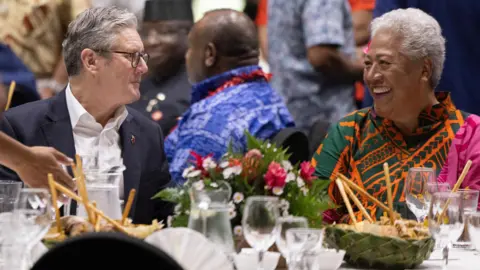 UK Government
UK GovernmentThe UK is “not going to be paying out” reparations for the transatlantic slave trade, Chancellor Rachel Reeves has told the BBC.
She said she understood why Commonwealth leaders would be making such demands but it was not something the UK government would commit to.
The legacy of slavery will be raised by the leaders at their summit in Samoa, which Prime Minister Sir Keir Starmer is attending.
Ahead of Friday’s meeting, he said he wanted to discuss current challenges, especially climate change, rather than issues of the past.
“That’s where I’m going to put my focus – rather than what will end up being very, very long endless discussions about reparations,” he said.
“Of course slavery is abhorrent to everybody; the trade and the practice, there’s no question about that. But I think from my point of view… I’d rather roll up my sleeves and work… on the current future-facing challenges.”
The chancellor reiterated that message in an interview with the BBC, saying: “We’re not going to be paying out the reparations that some countries are speaking about.
“I understand why they make those demands but that’s not something that this government is doing.”
Commonwealth leaders at the Samoa summit are expected to defy the UK and debate ways of securing reparations for historical slavery. At its height, Britain was the world’s biggest slave-trading nation.
Downing Street insists the issue is not on the agenda for the summit of 56 Commonwealth countries.
But diplomatic sources said officials were negotiating an agreement to conduct further research and begin a “meaningful conversation” about an issue which could potentially leave the UK owing billions of pounds in reparations.
Frederick Mitchell, foreign minister of the Bahamas, believes the UK could change its stance and he told BBC Radio 4’s Today programme: “Once you broach the subject it may take a while for people to come around but come around they will.”
Reparatory justice for slavery can come in many forms, including financial reparations, debt relief, an official apology, educational programmes, building museums, economic support, and public health assistance.
Mr Mitchell told the Commonwealth gathering: “It’s a simple matter – it can be done, one sentence, one line.”
He said to the BBC: “The word is apologise, that’s the word.”
Asked how much reparations should amount to, he said it was not just a matter of money but of “respect, acknowledging the past was a wrong that needs to be corrected”.
He said member countries “want the conversation to start” but “there appears to be even a reluctance to have the conversation”.
Earlier, a UK government spokesperson said: “Reparations are not on the agenda for the Commonwealth Heads of Government meeting. The government’s position has not changed – we do not pay reparations.
“We are focused on using the summit at [the Commonwealth Heads of Government Meeting] to discuss the shared opportunities which we can unlock across the Commonwealth – including securing more economic growth.”
It is understood the Downing Street position – that reparatory justice is not on the agenda – while technically correct, has angered some Caribbean ministers when it was obvious the issue would be discussed at the summit.
‘Sorrow and regret’
King Charles is in Samoa for a four-day visit and is due to formally open Friday’s summit.
On a visit to Kenya last year, the King expressed the “greatest sorrow and regret” over the “wrongdoings” of the colonial era, but stopped short of issuing an apology, which would have required the agreement of ministers.
Some non-Caribbean countries are not unsympathetic towards the British position and want the summit to focus more on existing challenges – such as climate change, which is adversely affecting many Commonwealth countries, about half of whom are small island states.
But Caribbean countries seem determined to keep pressing the issue.
All three candidates hoping to be elected this weekend as the next secretary general of the Commonwealth – Shirley Botchwey of Ghana, Joshua Setipa of Lesotho and Mamadou Tangara of Gambia – have made clear they support reparatory justice.
Politics
Councillors to be allowed to work from home, says Angela Rayner

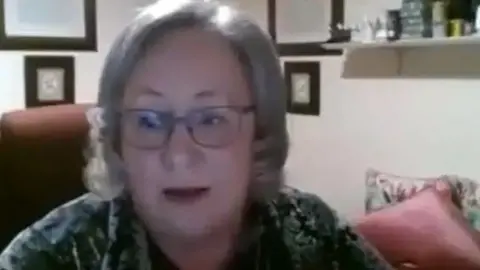 YouTube
YouTubeCouncillors in England will be allowed to take part in debates from home using their computers, Deputy Prime Minister Angela Rayner has announced.
At the moment all local councillors are required by law to attend certain meetings in person.
The rules were suspended during the Covid pandemic, which led to Parish Council officer Jackie Weaver briefly becoming a social media sensation.
The Zoom meeting she was chairing in early 2021 erupted into fury, with Ms Weaver being told she had “no authority here” after she kicked two councillors out of the meeting.
The law change allowing council meetings to be held remotely expired on 6 May 2021.
At the time, Ms Weaver joined calls to keep virtual meetings as an option, saying scrapping them would be a “dreadful idea”.
Under the proposed new rules, councillors will also be allowed to vote on behalf of others who can’t attend debates, such as for childcare or health reasons.
Rayner told local government chiefs it would be up to them to “decide whether councillors should attend your meetings remotely or use proxy votes when they need to”.
Speaking at the Local Government Association’s (LGA) annual conference in Harrogate, the deputy prime minister said she would “[make] it possible for people from all walks of life to have a stake in local democracy, whether they have caring responsibilities or aren’t able to make it to the town hall in person because of illness or disability”.
The government has published a public consultation on the proposals.
Last year an LGA survey of around a third of English councils found nine in 10 had councillors who would make use of virtual meetings if allowed.
It comes as Whitehall civil servants were told they should be spending at least three days a week working in the office.
Councillors will no longer have to make their home addresses public, Rayner also confirmed.
The LGA had previously pushed for ending the legal obligation to publish addresses amid a rise in abuse and intimidation faced by local councillors.
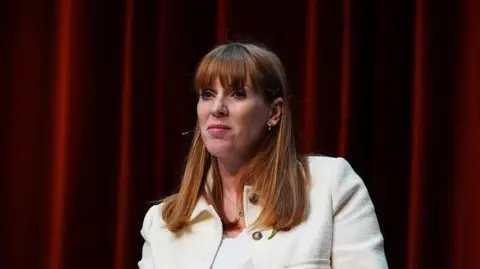 Getty Images
Getty ImagesRayner, who is also the Secretary of State for Housing, Communities and Local Government, said she would allow councils to suspend local councillors for bad behaviour.
She said she had been occasionally been “made aware of cases of persistent bullying and harassment by councillors, even in some case leading to victims resignations”.
Rayner also reiterated that the government will return to giving councils multi-year funding settlements.
The Conservatives had been agreeing funding on a yearly basis, which councils said made it hard to plan their budgets.
She also said she will end local authorities having to compete against each other for government grants.
But there was no hint that any more money might be in store for cash-strapped councils in the Budget next week.
One in four councils say they are likely to need an emergency bailout from the government within the next two years without more cash now.
Politics
Keir Starmer unlikely to meet Kamala Harris before US election

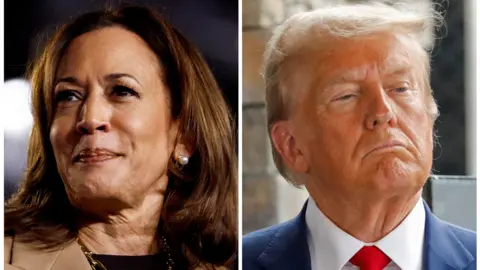 Reuters
ReutersSir Keir Starmer is unlikely to meet Kamala Harris before the US presidential election in 12 days’ time, Downing Street has indicated.
The prime minister met Republican nominee Donald Trump in New York last month, and suggested he wanted to do the same with Democrat Harris.
But Sir Keir is now in Samoa for a Commonwealth leaders’ summit, as the US campaign enters its final stage before the poll on 5 November.
In recent days, there have been tensions between the Labour Party and the Trump campaign over Labour staffers who volunteered to campaign for Harris.
The Trump team have filed a complaint with the US elections watchdog, alleging the help broke US election rules on foreign interference.
The complaint, filed with the Federal Election Commission (FEC), claimed Labour had “made, and the Harris campaign has accepted, illegal foreign national contributions”.
It also took issue with Sir Keir’s chief of staff, Morgan McSweeney, and Matthew Doyle, his director of communications, attending August’s Democratic convention in Chicago.
It is understood from Labour officials that Labour met McSweeney’s costs, while Doyle was hosted by the Progressive Policy Institute, a US think tank.
But the officials said it would be wrong to suggest either man had advised or assisted the Harris campaign, adding that Labour sends a delegation to every Democratic convention.
A string of senior Labour figures have also pushed back on the accusation that activists who volunteered to help the Harris campaign violated US campaign rules.
Cabinet minister Steve Reed said Labour had not funded or organised their trips, while Sir Keir told reporters the activists travelled “in their spare time”.
“They’re doing it as volunteers. They’re staying I think with other volunteers over there,” the prime minister added.
The row over campaigning was sparked by a now-deleted social media post from Labour’s head of operations, Sofia Patel, that she had about 100 current and former party staff heading to the US before polling day.
The LinkedIn post said she had “10 spots available” for anyone willing to travel to North Carolina to campaign for Harris, adding “we will sort your housing”.
Foreign nationals are permitted to volunteer in political campaigns in the US as long as they are not compensated, according to FEC rules.
Labour sources insist no one has done anything wrong, but there is concern about whether the row could impact the so-called “special relationship” between the UK and US should Trump win on 5 November.
On Wednesday, Scotland Office minister Kirsty McNeill pulled out of a guest appearance at an online event on US election night in support of Harris.
She had been due to speak via Zoom at a Labour for Women meeting called “Come on Kamala”, to provide election analysis in a “personal capacity”, a government spokesperson said.
Conservative shadow Scottish secretary John Lamont had accused McNeill of “hosting a fully fledged rally” for Harris.

Responding to the Trump team’s complaint during his plane journey to Samoa on Tuesday, Sir Keir denied the row would damage his relationship with the Republican candidate, reminding reporters the two had dinner together at Trump Tower in New York last month.
The prime minister’s deputy spokesperson stressed the UK would always have “a deep and strong relationship with the US as our closest ally” whoever won the election.
She was not aware of any plans for government ministers to speak to Trump’s campaign team, but Sir Keir and Trump had discussed “the long-standing friendship” between the two nations during their dinner, she said.
Nigel Farage, the Reform UK leader and Trump supporter, told the BBC he believed the wording of the LinkedIn post did breach US election law, saying the rules were “very, very clear”.
Farage, who has travelled to the US to support Trump on multiple occasions, said: “The ad didn’t say you’ll be going in your own free time, didn’t say you’ll have to pay your own air fare, which at the moment by the way are very, very expensive, it said you’re going to have free accommodation.
“If you look at the wording of that advert there is little doubt that is against American election law.”
-

 Technology4 weeks ago
Technology4 weeks agoIs sharing your smartphone PIN part of a healthy relationship?
-

 Science & Environment1 month ago
Science & Environment1 month agoHow to unsnarl a tangle of threads, according to physics
-

 Science & Environment1 month ago
Science & Environment1 month agoHyperelastic gel is one of the stretchiest materials known to science
-

 Science & Environment1 month ago
Science & Environment1 month ago‘Running of the bulls’ festival crowds move like charged particles
-

 Science & Environment1 month ago
Science & Environment1 month agoMaxwell’s demon charges quantum batteries inside of a quantum computer
-

 Science & Environment4 weeks ago
Science & Environment4 weeks agoX-rays reveal half-billion-year-old insect ancestor
-

 Technology1 month ago
Technology1 month agoWould-be reality TV contestants ‘not looking real’
-

 Science & Environment1 month ago
Science & Environment1 month agoSunlight-trapping device can generate temperatures over 1000°C
-

 Technology3 weeks ago
Technology3 weeks agoUkraine is using AI to manage the removal of Russian landmines
-

 Science & Environment1 month ago
Science & Environment1 month agoLiquid crystals could improve quantum communication devices
-

 Science & Environment1 month ago
Science & Environment1 month agoQuantum ‘supersolid’ matter stirred using magnets
-

 TV3 weeks ago
TV3 weeks agoসারাদেশে দিনব্যাপী বৃষ্টির পূর্বাভাস; সমুদ্রবন্দরে ৩ নম্বর সংকেত | Weather Today | Jamuna TV
-

 Science & Environment1 month ago
Science & Environment1 month agoA new kind of experiment at the Large Hadron Collider could unravel quantum reality
-

 Science & Environment1 month ago
Science & Environment1 month agoLaser helps turn an electron into a coil of mass and charge
-

 Womens Workouts1 month ago
Womens Workouts1 month ago3 Day Full Body Women’s Dumbbell Only Workout
-

 News3 weeks ago
News3 weeks agoMassive blasts in Beirut after renewed Israeli air strikes
-

 Football3 weeks ago
Football3 weeks agoRangers & Celtic ready for first SWPL derby showdown
-

 Technology3 weeks ago
Technology3 weeks agoSamsung Passkeys will work with Samsung’s smart home devices
-

 Business3 weeks ago
Business3 weeks agoWhen to tip and when not to tip
-

 News3 weeks ago
News3 weeks ago▶ Hamas Spent $1B on Tunnels Instead of Investing in a Future for Gaza’s People
-

 Technology4 weeks ago
Technology4 weeks agoMicrophone made of atom-thick graphene could be used in smartphones
-

 News3 weeks ago
News3 weeks agoNavigating the News Void: Opportunities for Revitalization
-

 MMA3 weeks ago
MMA3 weeks ago‘Uncrowned queen’ Kayla Harrison tastes blood, wants UFC title run
-

 Science & Environment1 month ago
Science & Environment1 month agoWhy this is a golden age for life to thrive across the universe
-
Business3 weeks ago
DoJ accuses Donald Trump of ‘private criminal effort’ to overturn 2020 election
-

 Sport3 weeks ago
Sport3 weeks agoMan City ask for Premier League season to be DELAYED as Pep Guardiola escalates fixture pile-up row
-

 Sport3 weeks ago
Sport3 weeks agoBoxing: World champion Nick Ball set for Liverpool homecoming against Ronny Rios
-

 Sport3 weeks ago
Sport3 weeks agoWales fall to second loss of WXV against Italy
-

 Science & Environment1 month ago
Science & Environment1 month agoPhysicists have worked out how to melt any material
-

 Science & Environment1 month ago
Science & Environment1 month agoQuantum forces used to automatically assemble tiny device
-

 Science & Environment1 month ago
Science & Environment1 month agoA slight curve helps rocks make the biggest splash
-

 Science & Environment1 month ago
Science & Environment1 month agoNerve fibres in the brain could generate quantum entanglement
-

 News1 month ago
News1 month ago▶️ Hamas in the West Bank: Rising Support and Deadly Attacks You Might Not Know About
-

 MMA3 weeks ago
MMA3 weeks agoJulianna Peña trashes Raquel Pennington’s behavior as champ
-

 MMA3 weeks ago
MMA3 weeks agoPereira vs. Rountree prediction: Champ chases legend status
-

 Science & Environment1 month ago
Science & Environment1 month agoHow to wrap your mind around the real multiverse
-

 Science & Environment1 month ago
Science & Environment1 month agoNuclear fusion experiment overcomes two key operating hurdles
-

 Technology1 month ago
Technology1 month agoMeta has a major opportunity to win the AI hardware race
-

 Technology4 weeks ago
Technology4 weeks agoWhy Machines Learn: A clever primer makes sense of what makes AI possible
-

 News1 month ago
News1 month ago▶️ Media Bias: How They Spin Attack on Hezbollah and Ignore the Reality
-

 Science & Environment1 month ago
Science & Environment1 month agoITER: Is the world’s biggest fusion experiment dead after new delay to 2035?
-

 MMA3 weeks ago
MMA3 weeks agoDana White’s Contender Series 74 recap, analysis, winner grades
-

 Technology3 weeks ago
Technology3 weeks agoThis AI video generator can melt, crush, blow up, or turn anything into cake
-

 Technology3 weeks ago
Technology3 weeks agoMusk faces SEC questions over X takeover
-

 News3 weeks ago
News3 weeks ago‘Blacks for Trump’ and Pennsylvania progressives play for undecided voters
-

 Technology3 weeks ago
Technology3 weeks agoMicrosoft just dropped Drasi, and it could change how we handle big data
-

 News3 weeks ago
News3 weeks agoFamily plans to honor hurricane victim using logs from fallen tree that killed him
-

 Sport3 weeks ago
Sport3 weeks agoCoco Gauff stages superb comeback to reach China Open final
-

 Science & Environment1 month ago
Science & Environment1 month agoTime travel sci-fi novel is a rip-roaringly good thought experiment
-

 Technology4 weeks ago
Technology4 weeks agoRussia is building ground-based kamikaze robots out of old hoverboards
-

 Sport4 weeks ago
Sport4 weeks agoWorld’s sexiest referee Claudia Romani shows off incredible figure in animal print bikini on South Beach
-

 Technology3 weeks ago
Technology3 weeks agoGmail gets redesigned summary cards with more data & features
-
Business3 weeks ago
Sterling slides after Bailey says BoE could be ‘a bit more aggressive’ on rates
-

 Sport3 weeks ago
Sport3 weeks agoSturm Graz: How Austrians ended Red Bull’s title dominance
-

 Entertainment3 weeks ago
Entertainment3 weeks agoNew documentary explores actor Christopher Reeve’s life and legacy
-

 Business3 weeks ago
Business3 weeks agoChancellor Rachel Reeves says she needs to raise £20bn. How might she do it?
-

 Technology3 weeks ago
Technology3 weeks agoTexas is suing TikTok for allegedly violating its new child privacy law
-

 Money3 weeks ago
Money3 weeks agoWetherspoons issues update on closures – see the full list of five still at risk and 26 gone for good
-

 Technology3 weeks ago
Technology3 weeks agoThe best budget robot vacuums for 2024
-

 MMA3 weeks ago
MMA3 weeks agoPereira vs. Rountree preview show live stream
-

 Sport3 weeks ago
Sport3 weeks agoAaron Ramsdale: Southampton goalkeeper left Arsenal for more game time
-

 MMA3 weeks ago
MMA3 weeks ago‘I was fighting on automatic pilot’ at UFC 306
-
News1 month ago
the pick of new debut fiction
-

 News1 month ago
News1 month agoOur millionaire neighbour blocks us from using public footpath & screams at us in street.. it’s like living in a WARZONE – WordupNews
-
Business3 weeks ago
Bank of England warns of ‘future stress’ from hedge fund bets against US Treasuries
-

 MMA3 weeks ago
MMA3 weeks agoAlex Pereira faces ‘trap game’ vs. Khalil Rountree
-

 News3 weeks ago
News3 weeks agoWoman who died of cancer ‘was misdiagnosed on phone call with GP’
-

 Sport3 weeks ago
Sport3 weeks agoChina Open: Carlos Alcaraz recovers to beat Jannik Sinner in dramatic final
-

 News3 weeks ago
News3 weeks agoGerman Car Company Declares Bankruptcy – 200 Employees Lose Their Jobs
-

 News3 weeks ago
News3 weeks agoHull KR 10-8 Warrington Wolves – Robins reach first Super League Grand Final
-

 MMA3 weeks ago
MMA3 weeks agoUFC 307 preview show: Will Alex Pereira’s wild ride continue, or does Khalil Rountree shock the world?
-

 MMA3 weeks ago
MMA3 weeks agoKetlen Vieira vs. Kayla Harrison pick, start time, odds: UFC 307
-

 Technology3 weeks ago
Technology3 weeks agoThe best shows on Max (formerly HBO Max) right now
-

 News3 weeks ago
News3 weeks agoHeavy strikes shake Beirut as Israel expands Lebanon campaign
-

 Technology3 weeks ago
Technology3 weeks agoJ.B. Hunt and UP.Labs launch venture lab to build logistics startups
-

 Football3 weeks ago
Football3 weeks agoWhy does Prince William support Aston Villa?
-
Business3 weeks ago
Head of UK Competition Appeal Tribunal to step down after rebuke for serious misconduct
-
Business3 weeks ago
The search for Japan’s ‘lost’ art
-

 Business3 weeks ago
Business3 weeks agoStark difference in UK and Ireland’s budgets
-

 News3 weeks ago
News3 weeks agoBalancing India and China Is the Challenge for Sri Lanka’s Dissanayake
-

 TV3 weeks ago
TV3 weeks agoLove Island star sparks feud rumours as one Islander is missing from glam girls’ night
-

 Sport3 weeks ago
Sport3 weeks ago2024 ICC Women’s T20 World Cup: Pakistan beat Sri Lanka
-

 Science & Environment3 weeks ago
Science & Environment3 weeks agoMarkets watch for dangers of further escalation
-

 TV3 weeks ago
TV3 weeks agoPhillip Schofield accidentally sets his camp on FIRE after using emergency radio to Channel 5 crew
-

 News3 weeks ago
News3 weeks agoHeartbreaking end to search as body of influencer, 27, found after yacht party shipwreck on ‘Devil’s Throat’ coastline
-

 Technology3 weeks ago
Technology3 weeks agoOpenAI secured more billions, but there’s still capital left for other startups
-

 Health & fitness3 weeks ago
Health & fitness3 weeks agoNHS surgeon who couldn’t find his scalpel cut patient’s chest open with the penknife he used to slice up his lunch
-

 Technology3 weeks ago
Technology3 weeks agoEpic Games CEO Tim Sweeney renews blast at ‘gatekeeper’ platform owners
-

 Money3 weeks ago
Money3 weeks agoPub selling Britain’s ‘CHEAPEST’ pints for just £2.60 – but you’ll have to follow super-strict rules to get in
-
Business3 weeks ago
Can liberals be trusted with liberalism?
-

 Football3 weeks ago
Football3 weeks agoSimo Valakari: New St Johnstone boss says Scotland special in his heart
-

 News3 weeks ago
News3 weeks agoLiverpool secure win over Bologna on a night that shows this format might work
-

 Technology3 weeks ago
Technology3 weeks agoApple iPhone 16 Plus vs Samsung Galaxy S24+
-

 TV3 weeks ago
TV3 weeks agoMaayavi (මායාවී) | Episode 23 | 02nd October 2024 | Sirasa TV
-
Politics3 weeks ago
Rosie Duffield’s savage departure raises difficult questions for Keir Starmer. He’d be foolish to ignore them | Gaby Hinsliff
-

 Technology3 weeks ago
Technology3 weeks agoPopular financial newsletter claims Roblox enables child sexual abuse
-

 Technology3 weeks ago
Technology3 weeks agoHow to disable Google Assistant on your Pixel Watch 3
-

 Technology3 weeks ago
Technology3 weeks agoA very underrated horror movie sequel is streaming on Max
-

 Entertainment3 weeks ago
Entertainment3 weeks ago“Golden owl” treasure hunt launched decades ago may finally have been solved
-

 Science & Environment1 month ago
Science & Environment1 month agoPhysicists are grappling with their own reproducibility crisis


You must be logged in to post a comment Login